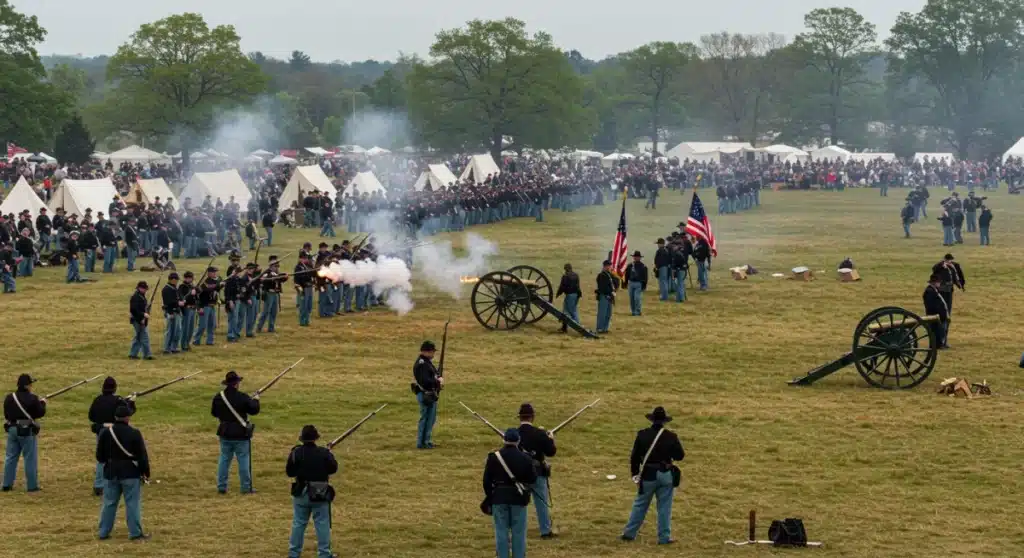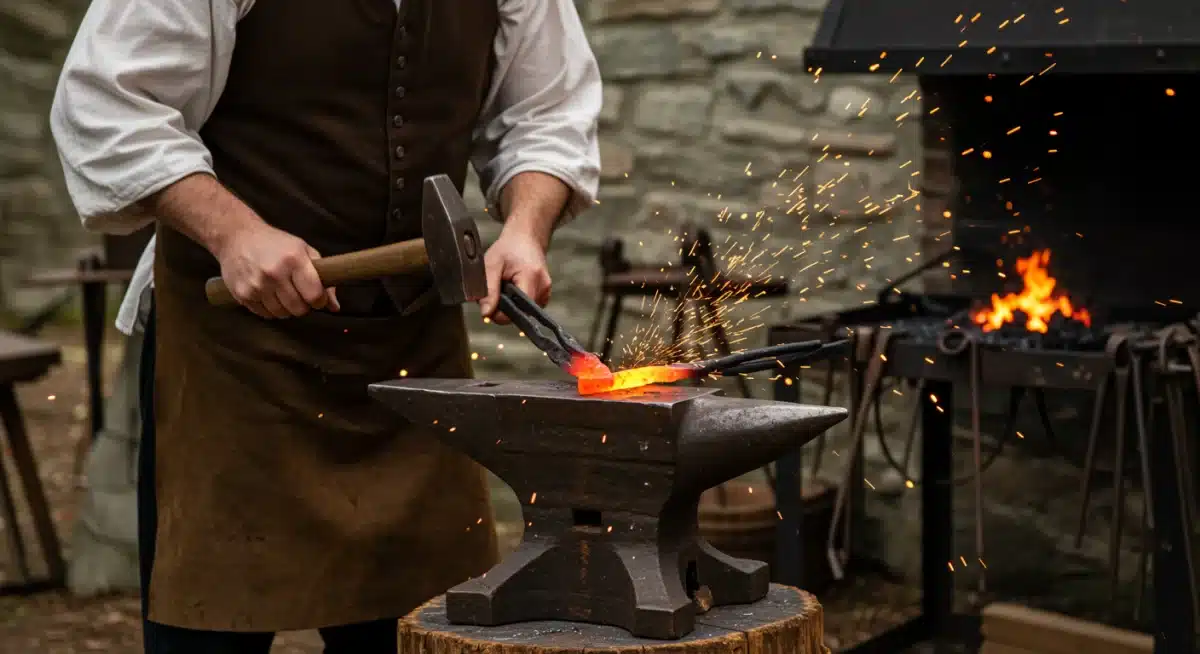Historical Reenactments 2025: 3 Immersive U.S. Experiences

Three immersive U.S. historical reenactments are set to captivate audiences in 2025, offering unparalleled opportunities to experience pivotal moments that shaped American history firsthand.
As 2025 approaches, enthusiasts of living history are eagerly anticipating a series of exceptional events. These historical reenactments 2025 promise to bring America’s past vividly to life, offering immersive experiences that go beyond textbooks and documentaries. Prepare to step back in time and witness history unfold before your eyes.
The Grand Civil War Spectacle: Gettysburg’s 2025 Commemoration
The Battle of Gettysburg remains one of the most pivotal and bloodiest engagements of the American Civil War. In 2025, the historic fields of Gettysburg, Pennsylvania, will once again host a massive reenactment, drawing thousands of participants and spectators. This event is not just a display; it is a meticulously researched and executed recreation designed to honor the sacrifices made during those fateful days.
Organizers are currently finalizing the schedule for July 2025, with early bird registrations for reenactors expected to open in late 2024. The scale of this commemoration is anticipated to surpass recent events, aiming for an even greater historical accuracy and immersion for attendees.
Preparations Underway for Massive Participation
The Gettysburg 2025 reenactment is a monumental undertaking, requiring extensive planning and coordination. The Gettysburg Battlefield Preservation Association (GBPA) is reportedly working closely with local authorities and historical societies to ensure logistical excellence and historical integrity.
- Participant Training: Reenactors undergo rigorous training to ensure authentic drill movements, weapon handling, and understanding of period tactics.
- Authentic Attire: Every uniform, accoutrement, and piece of equipment is carefully replicated to match historical specifications, enhancing the visual authenticity.
- Campsite Immersion: Living history camps will be open to the public, allowing visitors to interact with reenactors and observe daily life during the 1860s.
This event offers an unparalleled opportunity to understand the complexities of Civil War combat and the human stories behind the statistics. From the thunder of artillery to the poignant bugle calls, visitors will gain a deeper appreciation for this defining moment in American history.
Colonial Williamsburg’s Expanded Living History Programs
Colonial Williamsburg, Virginia, consistently delivers one of the most comprehensive living history experiences in the United States. For 2025, the foundation is rolling out expanded programming, focusing on a more interactive and personalized visitor journey into 18th-century American life. This initiative aims to immerse guests deeper into the daily routines, political debates, and societal structures that shaped the nascent nation.
New exhibits and character interpretations are slated for introduction throughout the year, according to recent announcements from the Colonial Williamsburg Foundation. These additions will highlight previously underrepresented narratives, enriching the overall understanding of the period leading up to the American Revolution.
Daily Life in the 18th Century
Visitors to Colonial Williamsburg in 2025 can expect to engage with a vibrant community of historical interpreters. These individuals embody figures from all walks of 18th-century life, from tradespeople and merchants to political figures and enslaved persons, offering diverse perspectives on the colonial experience.
- Trades Demonstrations: Witness blacksmiths, shoemakers, and printers practicing their crafts using traditional tools and methods.
- Judicial Proceedings: Attend mock trials and legislative sessions, gaining insight into the legal and political systems of the era.
- Domestic Life: Explore homes and kitchens, learning about period cooking, gardening, and family dynamics.
The emphasis on interactive storytelling ensures that every visit is unique. Guests can participate in conversations, ask questions, and even engage in activities like colonial games or militia drills. This dynamic approach makes the history tangible and relatable, fostering a profound connection to the past.

Frontier Days at Fort Laramie: A Glimpse into the Old West
Fort Laramie National Historic Site in Wyoming is preparing for its “Frontier Days” reenactment in 2025, an event dedicated to showcasing the rugged life and complex history of the American West during the 19th century. This reenactment focuses on the interactions between U.S. Army soldiers, Native American tribes, trappers, and pioneers who traversed the Oregon Trail.
Scheduled for late summer 2025, this event will feature meticulously recreated encampments, demonstrations of frontier skills, and narratives exploring the diverse cultures that converged at this critical outpost. Park officials have indicated a renewed commitment to presenting a balanced and comprehensive view of the era, including the perspectives of all groups involved.
Exploring the Dynamics of the Frontier
The Fort Laramie reenactment aims to educate visitors on the challenges and opportunities that defined the American frontier. From the daily routines of soldiers to the survival techniques of mountain men, the event provides a hands-on understanding of westward expansion.
- Military Drills: Observe U.S. Army infantry and cavalry drills, understanding the role of the military in frontier protection and expansion.
- Native American Culture: Engage with interpreters discussing the history, traditions, and impact of westward expansion on indigenous peoples.
- Pioneer Skills: Learn about traditional skills such as hide tanning, fire starting, and open-fire cooking essential for survival on the plains.
This immersive experience at Fort Laramie goes beyond simple demonstrations, delving into the political treaties, economic exchanges, and cultural clashes that characterized the Old West. It offers a vital connection to a pivotal period of American development, highlighting both its triumphs and its tragedies.
Why Immersive Reenactments Matter
Immersive historical reenactments serve a crucial role in education and cultural preservation. They provide a multi-sensory experience that static museum exhibits or books cannot fully replicate. By engaging with living history, participants and spectators gain a more profound and empathetic understanding of past events and the people who lived through them.
These events foster a sense of connection to heritage, encouraging critical thinking about historical narratives. The attention to detail in costumes, settings, and daily activities allows for a deeper appreciation of the challenges and triumphs faced by previous generations, making history feel less abstract and more immediate.
Educational Value and Public Engagement
Beyond entertainment, reenactments are powerful educational tools. Schools often organize field trips to these events, recognizing their ability to ignite curiosity and facilitate learning in a dynamic environment. The direct interaction with historical figures and settings transforms abstract concepts into vivid, memorable experiences.
- Hands-On Learning: Opportunities to handle replica artifacts, try period crafts, and participate in historical games.
- Expert Interpretation: Engaging with knowledgeable reenactors who can answer questions and provide context from a first-person perspective.
- Community Building: Reenactment groups often form tight-knit communities, dedicated to historical research and the accurate portrayal of their chosen period.
The public engagement generated by these events helps to keep history alive and relevant. They remind us that history is not just a collection of dates and names, but a continuous story of human experience that continues to shape our present and future.
Planning Your 2025 Historical Adventure
Attending a historical reenactment in 2025 requires some planning to maximize your experience. Given the popularity of these events, especially major commemorations, early booking for accommodations and tickets is highly advisable. Many organizers offer multi-day passes, allowing for a more thorough exploration of the various activities and demonstrations.
Researching the specific event schedule beforehand is also crucial. This allows you to prioritize the battles, demonstrations, or living history camps that interest you most. Remember to check for any special evening programs or lectures that might be offered, as these often provide unique insights not available during daytime events.
Tips for an Optimal Experience
To fully enjoy your visit, consider these practical tips. Comfortable walking shoes are a must, as you will likely be covering significant distances on uneven terrain. Sun protection, including hats and sunscreen, is also essential, especially for outdoor events during warmer months.
- Dress Appropriately: Wear comfortable clothing suitable for walking and spending extended periods outdoors.
- Stay Hydrated: Bring water bottles or plan to purchase beverages, as dehydration can quickly detract from your enjoyment.
- Bring a Camera: Capture the stunning visuals, but be respectful of reenactors and their space.
Engage with the reenactors; they are often passionate experts eager to share their knowledge. Asking thoughtful questions can unlock fascinating details and personal stories, enriching your understanding of the period. These interactions are often the most memorable aspects of a living history visit.
The Economic and Cultural Impact of Reenactments
Large-scale historical reenactments are not only educational and entertaining; they also have a significant economic and cultural impact on their host communities. These events draw thousands of visitors, leading to increased revenue for local businesses, including hotels, restaurants, and retail establishments. The influx of tourists stimulates the local economy, supporting jobs and services.
Culturally, reenactments help to preserve historical sites and traditions. The funds generated often contribute to the maintenance and restoration of battlefields, historic buildings, and museums. They also foster a sense of local pride and identity, celebrating the unique heritage of a region.
Community Benefits and Preservation Efforts
The organization of reenactments often involves collaboration between local governments, historical societies, and volunteer groups. This partnership strengthens community ties and promotes civic engagement. The shared goal of accurately portraying history creates a collective effort that benefits everyone.
- Tourism Boost: Significant increase in visitor numbers, driving local economic activity.
- Site Preservation: Revenue and awareness help fund the conservation of historical landmarks.
- Educational Outreach: Provides unique learning opportunities for local schools and residents.
Furthermore, these events often inspire new generations to take an interest in history, potentially leading to future historians, preservationists, and educators. The legacy of these reenactments extends far beyond the event dates, contributing to a deeper, more enduring appreciation of the past.
| Key Reenactment | Description |
|---|---|
| Gettysburg 2025 | Large-scale Civil War battle commemoration, emphasizing historical accuracy and immersive camp life. |
| Colonial Williamsburg | Expanded 18th-century living history programs with new exhibits and diverse character interpretations. |
| Fort Laramie Frontier Days | Recreation of 19th-century American West life, focusing on soldiers, Native Americans, and pioneers. |
| Educational Impact | These events provide hands-on learning, foster empathy, and preserve historical sites and narratives. |
Frequently Asked Questions About 2025 Reenactments
Attending historical reenactments offers immersive, hands-on learning experiences that bring history to life. Visitors gain a deeper understanding of past events, cultures, and daily life, fostering empathy and a tangible connection to historical narratives.
Organizers collaborate with historians, historical societies, and experts to meticulously research period details. Reenactors undergo extensive training in drills, attire, and customs. Every effort is made to replicate settings, equipment, and interactions as authentically as possible.
Yes, most historical reenactments are family-friendly and highly educational for children. They often include specific programs, interactive demonstrations, and opportunities for kids to engage directly with history in a fun and memorable way.
It is recommended to wear comfortable walking shoes and weather-appropriate clothing, as most events are outdoors. Bring water, sunscreen, a hat, and a camera. Consider a portable chair for extended viewing of battles or demonstrations.
Specific dates and ticket information are typically released on the official websites of the historical sites or organizing bodies. It is advisable to check these sites regularly and consider signing up for newsletters for early announcements and registration details.
Looking Ahead
The upcoming historical reenactments 2025 in the U.S. represent a significant opportunity for public engagement with the nation’s past. As planning continues, further details regarding event schedules, participant registration, and visitor amenities are expected to emerge. These events will undoubtedly continue to play a vital role in historical education and cultural tourism, solidifying their place as essential experiences for anyone wishing to connect with American history on a deeper level.